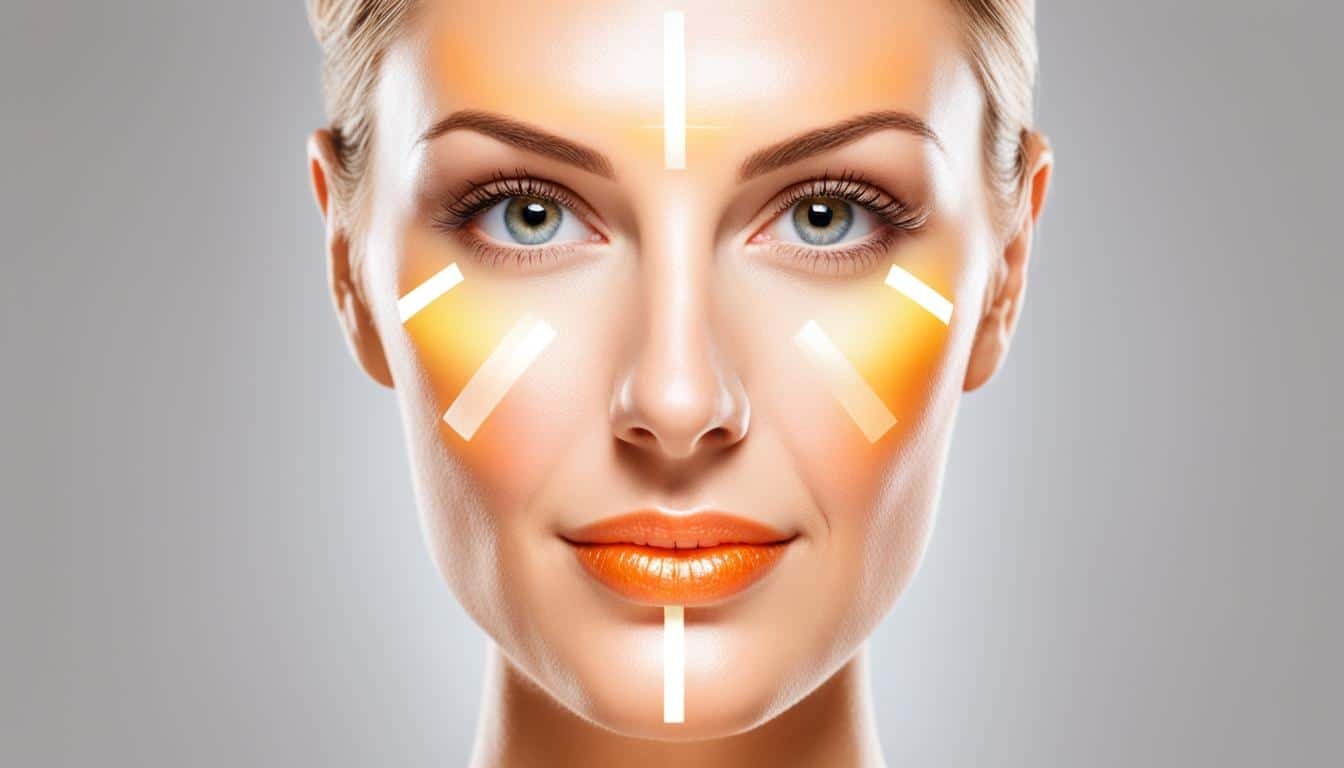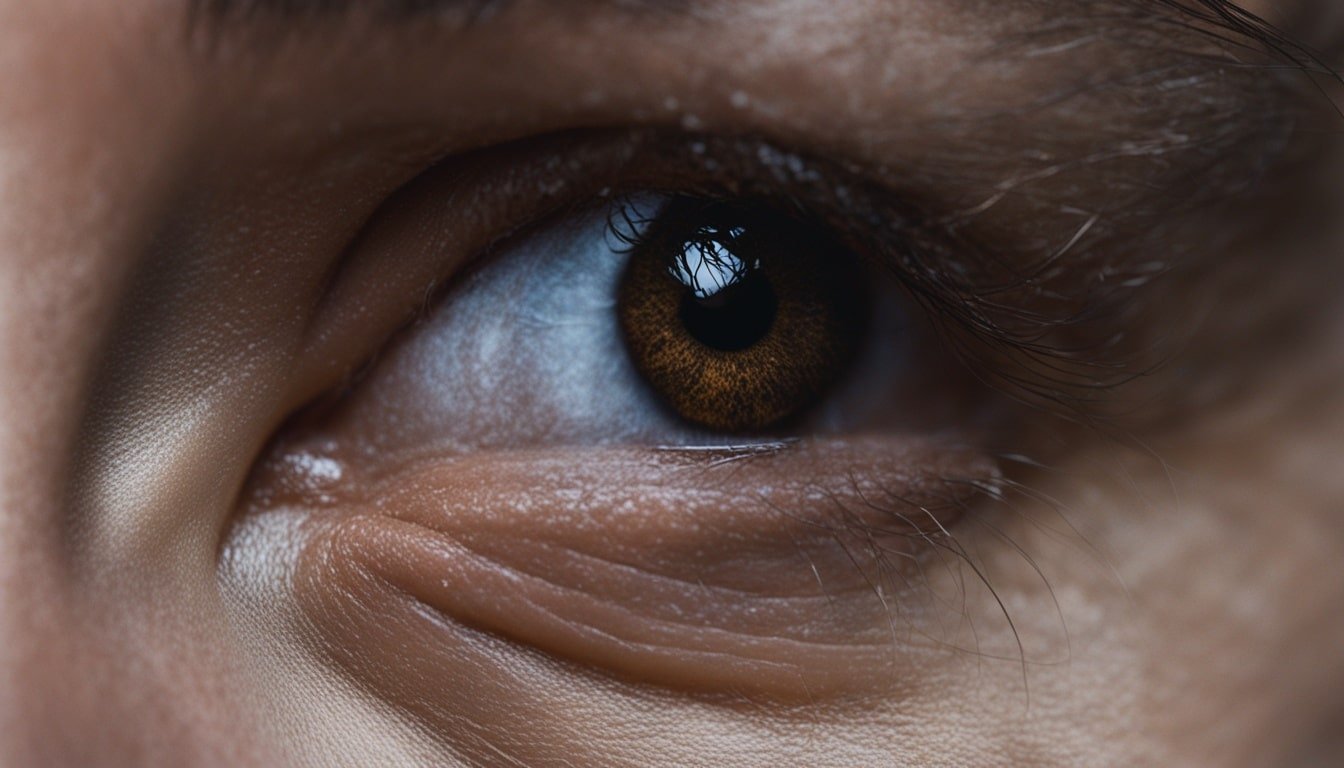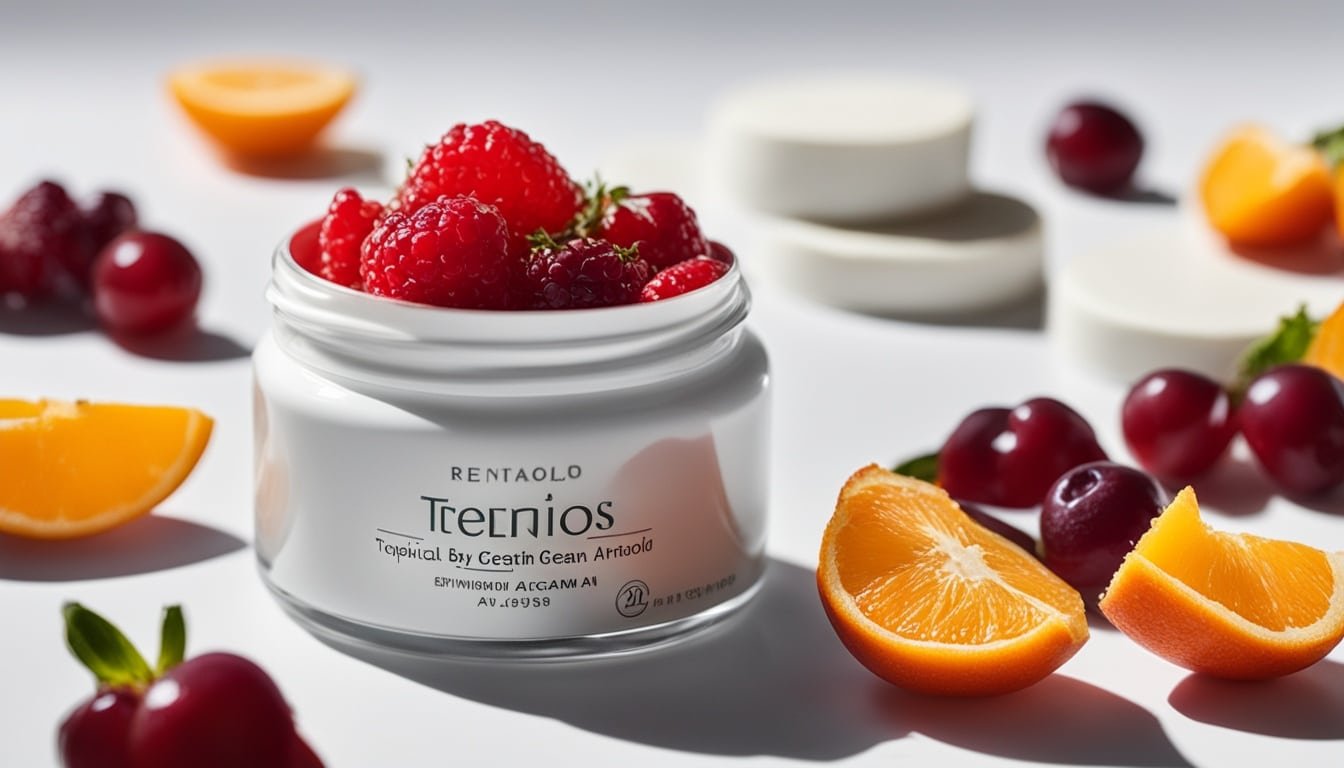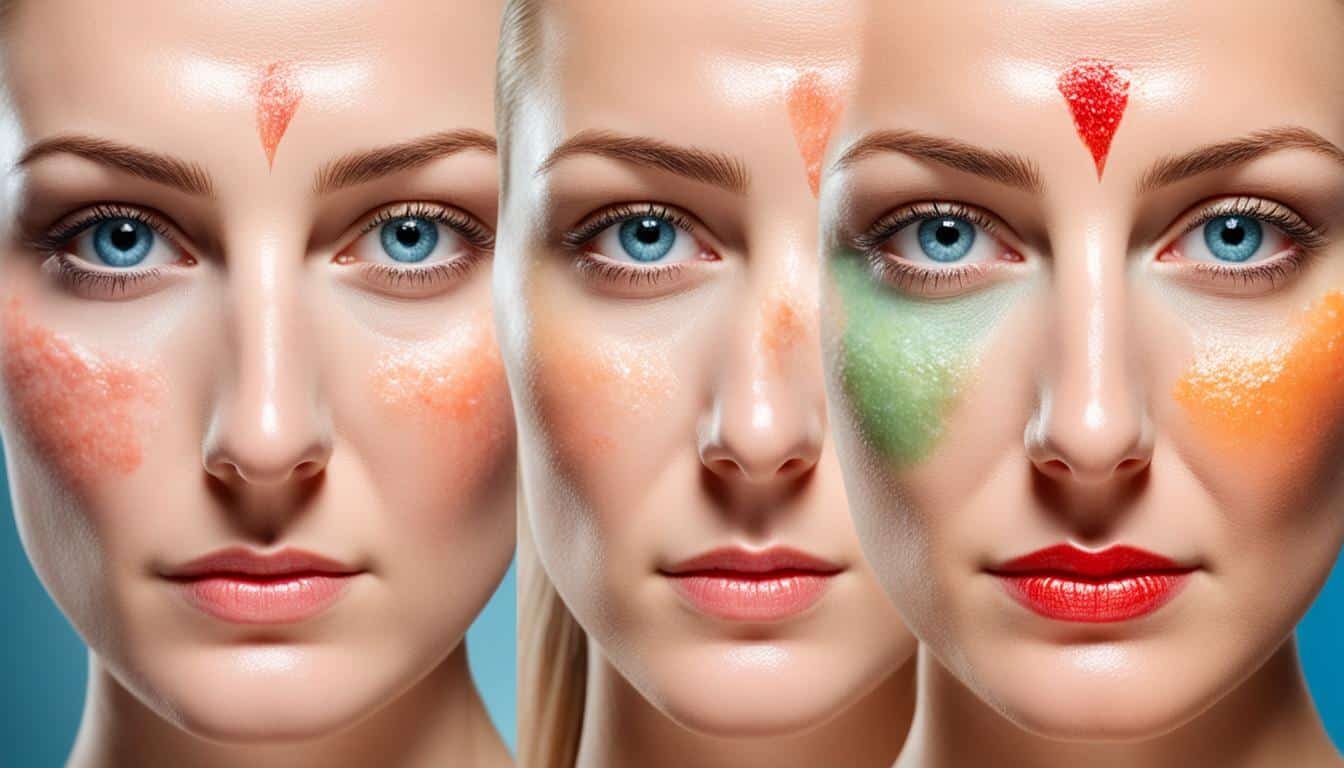Vitamin A is key for keeping your skin healthy. It helps improve your skin’s look, lessen dark spots, and treat skin issues. You can use it on your skin or take it as a pill, and it offers many benefits for your skin.
Key Takeaways
- Vitamin A is essential for skin health, supporting cell growth and collagen production.
- Topical vitamin A (retinoids) can help improve skin appearance, reduce sun damage, and treat acne.
- Oral vitamin A supplements can address vitamin A deficiency, which can lead to dry, scaly skin and other skin problems.
- Vitamin A is important for maintaining healthy immune function and addressing skin conditions like psoriasis.
- It’s important to use vitamin A supplements cautiously, as high doses can lead to side effects like skin irritation and liver damage.
Introduction to Vitamin A
Vitamin A For Skin Health Vitamin A is a fat-soluble nutrient vital for our health and well-being. It helps with vision, cell growth, and boosts the immune system. This vitamin is key for our overall health.
What is Vitamin A?
Vitamin A includes retinoids like retinol, retinal, and retinoic acid. These come from animal and plant sources. You can find retinoids in liver, dairy products, eggs, and fish liver oils. Carotenoids, like beta-carotene, are in fruits and vegetables.
Sources of Vitamin A
You can get Vitamin A from different foods, including:
- Animal-based sources: Liver, dairy products, eggs, and fish liver oils
- Plant-based sources: Carrots, sweet potatoes, leafy greens, and fruits like cantaloupe and mango
Our bodies can turn beta-carotene and other carotenoids into active vitamin A. This makes plant sources a great way to get this vitamin.
“Vitamin A is essential for maintaining healthy skin, vision, and immune function.”
Role of Vitamin A in Skin Health

Vitamin A is a key nutrient for the skin. It helps improve skin look, reduce dark spots, and lessen sun damage. This vitamin is vital for keeping skin healthy and glowing.
Improving Skin Appearance
Vitamin A boosts collagen production, which is important for skin’s firmness and elasticity. This means it can lessen fine lines and wrinkles, making skin look younger and brighter. It also helps skin cells turn over faster, making skin smoother and more even.
Reducing Hyperpigmentation and Sun Damage
Vitamin A is great for dealing with dark spots and sun damage. Its antioxidants fight off free radicals and protect against UV rays. This reduces age spots and freckles, making skin look more even and bright.
Carotenoids in vitamin A sources like sweet potatoes and carrots add more benefits. They protect skin from pollution and UV rays, helping it stay young and healthy.
“Vitamin A is a powerful ally in the quest for radiant, healthy skin. From boosting collagen to reducing hyperpigmentation, this versatile nutrient is essential for maintaining a vibrant, even-toned complexion.”
Vitamin A For Skin Health

Vitamin A is a key nutrient for healthy skin. It’s vital for many skin functions. It helps keep the skin looking good and healthy.
Vitamin A for skin health makes the skin look better. It helps cells turn over, reducing fine lines and wrinkles. This makes the skin look younger. It also makes skin elastic and glowing.
The skin health benefits of vitamin A also help with dark spots and sun damage. It stops the production of melanin, which causes dark spots. This helps make skin tone even. It also protects skin from the sun’s harmful rays, lowering the risk of damage.
- Improves skin appearance by promoting cell turnover and enhancing elasticity
- Reduces hyperpigmentation and sun damage by inhibiting melanin production
- Protects the skin from the harmful effects of UV radiation
Vitamin A can be used on the skin or taken as a supplement. It’s a powerful tool for keeping skin healthy and bright. Its ability to tackle various skin issues makes it a key nutrient for a glowing, youthful look.
“Vitamin A is an essential nutrient for maintaining the health and appearance of our skin.”
Benefits of Vitamin A for Acne Treatment
Vitamin A, especially in the form of topical retinoids, is a great way to fight acne. It targets the main causes of breakouts for a clear, healthy skin.
Exfoliating and Unclogging Pores
Vitamin A for acne treatment is great for exfoliating the skin. Retinoids, a type of vitamin A, clear out dirt, oil, and dead skin cells. This stops pimples and blackheads from forming.
By keeping pores clear, vitamin A makes your skin look smoother and more radiant.
Reducing Scarring and Pore Size
Vitamin A can also lessen acne scarring and shrink pore size. Retinoids boost collagen and elastin production. These are key for skin’s firmness and elasticity.
This leads to fewer acne scars and a smoother skin texture. Topical retinoids for acne help reduce pore size and exfoliate skin.
| Benefit | Description |
|---|---|
| Exfoliating and Unclogging Pores | Vitamin A, in the form of retinoids, can help remove dirt, oil, and dead skin cells that clog pores, preventing the formation of pimples and blackheads. |
| Reducing Scarring and Pore Size | Retinoids stimulate the production of collagen and elastin, leading to a reduction in the visibility of acne scars and a more refined, even skin texture. |
“Topical retinoids are considered first-line therapy for acne because of their ability to normalize follicular keratinization, reduce sebum production, and have anti-inflammatory effects.”
– American Academy of Dermatology
Vitamin A for Psoriasis and Other Skin Conditions
Vitamin A is a strong antioxidant that keeps skin healthy. It’s especially helpful for people with psoriasis, a condition that causes skin inflammation. Vitamin A treatments can ease symptoms by reducing skin patches and inflammation.
Oral retinoids like acitretin are sometimes given for severe psoriasis. These treatments help control skin cell growth and lessen inflammation.
Vitamin A isn’t just for psoriasis. It also helps with other skin conditions. For example, drugs like bexarotene are used to treat skin cancers and other skin problems.
“Vitamin A plays a vital role in maintaining the integrity and health of the skin, making it a valuable tool in the treatment of various skin conditions.”
Using vitamin A-based treatments can make a big difference. They work by tackling the root causes of skin diseases. This can lead to better health and a better life for those affected.
Vitamin A Deficiency and Its Effects

In the United States, vitamin A deficiency is rare. But, it’s a big health issue in many poor countries. Vitamin A deficiency can harm your eyes and weaken your immune system.
Symptoms of Vitamin A Deficiency
The main signs of vitamin A deficiency are:
- Night blindness, or trouble seeing in dim light
- Dry, itchy eyes and a higher chance of eye infections
- Rough, dry skin and more skin infections
- More colds and flu and a weaker immune system
- Slow growth and development in kids
Severe vitamin A deficiency can cause permanent vision loss or even blindness. It’s a big problem in developing countries where good food is hard to get.
In the US, vitamin A deficiency is rare thanks to food fortification and plenty of nutrient-rich foods. But, some people might still be at risk. This includes those with digestive issues or who eat very little.
“Vitamin A is key for healthy eyes, skin, and immune system. Not having enough can lead to serious issues, especially in poor countries where good food is scarce.”
Topical and Oral Vitamin A Supplements

There are many ways to add vitamin A to your skincare routine. Topical retinoids are a top choice, available over-the-counter or by prescription. They are great for reducing fine lines, treating acne, and more.
Topical Retinoids
Over-the-counter retinoids are perfect for beginners. They make skin look smoother and more even. Prescription retinoids are stronger and tackle tougher skin problems.
Oral Vitamin A Supplements
You can also take oral vitamin A supplements. They come in different forms like retinol and beta-carotene. But, always talk to a doctor before starting them to avoid side effects.
Choosing between topical or oral vitamin A depends on your skin needs. Always follow the instructions and watch how your skin reacts for the best results and safety vitamin a supplements may.
Precautions and Side Effects

Vitamin A is great for skin health, but we must be careful with it. Topical retinoids, a type of vitamin A, can make your skin dry, red, and more sensitive to the sun. Taking too much preformed vitamin A (retinol) can cause headaches, harm your liver, and lead to birth defects dietary supplements vitamin a levels vitamin a and carotenoids vitamin a and beta-carotene vitamin a along risk of vitamin use of vitamin.
Potential Side Effects of Topical Retinoids
- Skin dryness and irritation
- Redness and inflammation
- Increased sun sensitivity, leading to sunburns
- Peeling and flaking of the skin
Risks of Excessive Vitamin A Intake
- Headaches and dizziness
- Liver damage and toxicity (vitamin A toxicity)
- Birth defects in pregnant women
- Interactions with certain medications, including blood thinners and cholesterol-lowering drugs
Always talk to a healthcare provider before taking vitamin A supplements. This is true for both topical and oral forms. Using too much can cause serious problems absorption of vitamin combination of vitamin doses of vitamin a may absorb vitamin contain vitamin enough vitamin much vitamin.
“Vitamin A is a powerful nutrient, but it must be used with caution to avoid potential side effects.”
Also Read : Soothing Sensations: Menopause Skincare Solutions
Conclusion
Vitamin A is a key nutrient for skin health. It helps reduce aging signs and treat acne and psoriasis. This powerful compound makes skin healthier and more radiant.
Using both topical and oral vitamin A can be good. But, always use them safely and with a doctor’s advice to avoid side effects. Adding vitamin A to your skincare routine, along with a healthy diet and lifestyle, can bring out its full benefits.
If you want better skin, address skin issues, or support your skin’s health, vitamin A is a great choice. By knowing how to use it, you can start a path to healthier, glowing skin.
FAQs
Q: What are the benefits of using vitamin A for skin health?
A: Vitamin A is essential for maintaining healthy skin as it promotes cell turnover, helps in the repair of sun-damaged skin, and can improve the overall texture and appearance of the skin. It also plays a role in combating skin disorders like acne and psoriasis.
Q: How can vitamin A supplementation benefit the skin?
A: Vitamin A supplementation can help address skin issues such as acne, wrinkles, and hyperpigmentation by promoting healthy skin cell growth and repair.
Q: What are the risks associated with taking high doses of vitamin A for skin health?
A: High doses of vitamin A, particularly in the form of supplements, can lead to toxicity symptoms such as nausea, headaches, and in severe cases, liver damage. It is crucial to consult a healthcare provider before taking high doses of vitamin A.
Q: Is it safe to take high doses of vitamin A during pregnancy?
A: High doses of vitamin A during pregnancy can pose risks to the developing fetus and may lead to birth defects. Pregnant women should avoid consuming excessive amounts of vitamin A and consult their healthcare provider for guidance.
Q: How does vitamin A help in improving skin health?
A: Vitamin A helps in the production of new skin cells, promotes collagen production, and aids in the repair of damaged skin tissues, resulting in healthier and more radiant skin.
Q: Can vitamin A supplements cause serious side effects?
A: Yes, high doses of vitamin A supplements can lead to serious side effects such as liver damage, bone abnormalities, and vision changes. It is important to follow recommended dosage guidelines and seek medical advice before starting any supplementation.
Q: What are the potential risks of combining vitamin A with other vitamins?
A: Combining vitamin A with other vitamins, such as vitamin E, may enhance the benefits for skin health. However, it is essential to be cautious about consuming large amounts of fat-soluble vitamins, as excessive intake can lead to toxicity.
Q: How does vitamin A impact the absorption of other nutrients in the body?
A: Vitamin A plays a crucial role in improving the absorption of other nutrients like iron and zinc in the body. Adequate levels of vitamin A can enhance overall nutrient absorption and support skin health.
Source Links
- https://www.mountsinai.org/health-library/supplement/vitamin-a-retinol
- https://www.healthline.com/health/vitamin-a-for-skin
- https://www.environskincare.com/vitamin-a/what-does-vitamin-a-do-for-your-skin/




